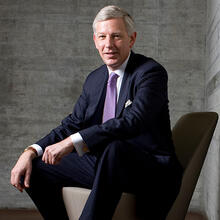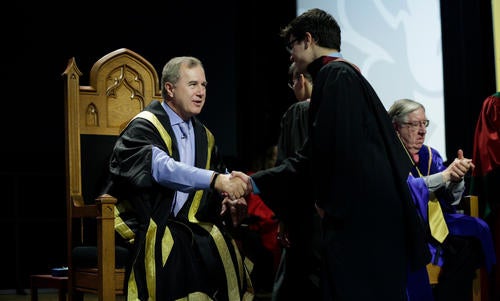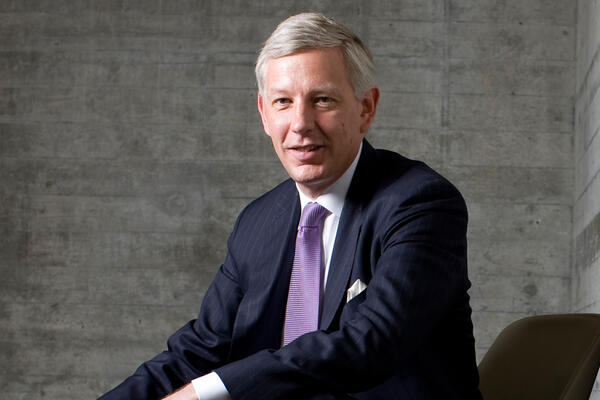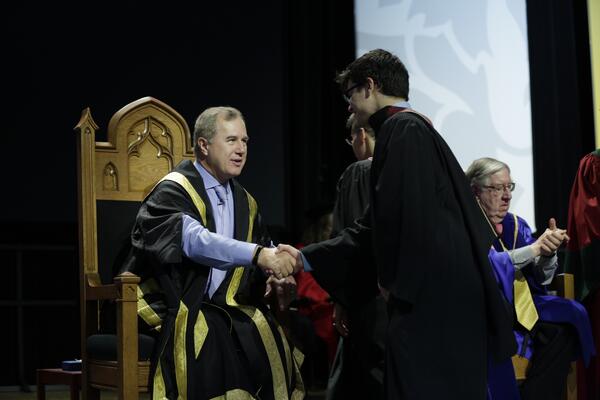
Dominic Barton to be officially installed as Waterloo’s 11th chancellor
The chancellor’s installation signifies the formal changing of a new institutional champion.

The chancellor’s installation signifies the formal changing of a new institutional champion.
By Natalie Quinlan University Relations On Saturday, Oct. 27, the 11th chancellor of the University of Waterloo, Dominic Barton, will be installed as a leading ambassador and voluntary ceremonial head of the University. The installation is an important centuries-old rite where the conferment of authority is signified and a long-standing intersection of tradition and fresh beginning for the University is proclaimed. The chancellor presides over convocation ceremonies every spring and fall, and has the authority to award all degrees, diplomas and certificates including honorary degrees.
On Saturday, Oct. 27, the 11th chancellor of the University of Waterloo, Dominic Barton, will be installed as a leading ambassador and voluntary ceremonial head of the University. The installation is an important centuries-old rite where the conferment of authority is signified and a long-standing intersection of tradition and fresh beginning for the University is proclaimed. The chancellor presides over convocation ceremonies every spring and fall, and has the authority to award all degrees, diplomas and certificates including honorary degrees.
Barton has provided strategic advice to national leaders, in both government and business throughout his career, currently as a senior partner and former global managing partner of McKinsey & Company.
“I think the students at the University of Waterloo are amazing — the innovation here is just unbelievable and that’s the real talent,” said Barton. “The people here are taking what seem to be impossible problems and they’re going to make solutions for them. It’s wonderful.”
Prime Minister Justin Trudeau welcomes Dominic Barton as chancellor.
In May 2015, Barton joined Feridun Hamdullahpur, president and vice-chancellor at the University of Waterloo, and other government, business and academic leaders across the globe in committing his organization to the UN Women’s HeForShe IMPACT 10x10x10 gender equity initiative.
“Dominic Barton is renowned for his strategic insights and expert guidance on business, governance and economic development,” said Hamdullahpur. “We are inspired by Dominic’s commitment to creating positive global change and to equity and inclusivity which in many ways complement our University’s record of innovation and aspirations to make a global impact.”
Barton also chairs the Government of Canada’s Advisory Council on Economic Growth and is a trustee of the Brookings Institution, a member of the Singapore Economic Development Board’s International Advisory Council, a board member at Memorial Sloan Kettering in New York, and the Asia Pacific Foundation Canada. He is also a Rhodes trustee and an honorary fellow at Brasenose College in Oxford England.
Born in Uganda and a Ugandan and Canadian citizen, Barton received a BA Honours in economics from the University of British Columbia and studied as a Rhodes scholar at Brasenose College at the University of Oxford. He is the author of more than 80 articles and several books ranging from the role of business in society to leadership and talent development.
“There’s a lot of things the world can learn from the University of Waterloo. It’s about innovation, it’s about entrepreneurship, but it’s also about the cross-sector integration, the meshing of different disciplines coming together and the encouragement of that. That’s unusual to have both of those together.”

Tom Jenkins (left) shakes the hand of a graduating student.
Barton succeeds Tom Jenkins as chancellor. Jenkins, chair of the board at OpenText Corporation and Chair of the National Research Council, served as chancellor for three years. The University will name Jenkins chancellor emeritus. Jenkins was an early supporter of opening the University’s Stratford campus and he and his wife Toby Jenkins (BES ‘82) have also supported the University of Waterloo with contributions of more than $23 million.
Past chancellors of the University of Waterloo also include Prem Watsa, chair of Fairfax Financial Holdings, Mike Lazaridis (DEng ’00), principal of Quantum Valley Investments® and Valentine O’Donovan, founder of COM DEV Intl.

Read more
Dominic Barton, global managing partner of McKinsey & Company, is a champion for diversity, sustainability and talent-driven organizations.

Read more
Tom Jenkins moves on from his role as chancellor following spring convocation.

Read more
Here are the people and events behind some of this year’s most compelling Waterloo stories
The University of Waterloo acknowledges that much of our work takes place on the traditional territory of the Neutral, Anishinaabeg, and Haudenosaunee peoples. Our main campus is situated on the Haldimand Tract, the land granted to the Six Nations that includes six miles on each side of the Grand River. Our active work toward reconciliation takes place across our campuses through research, learning, teaching, and community building, and is co-ordinated within the Office of Indigenous Relations.